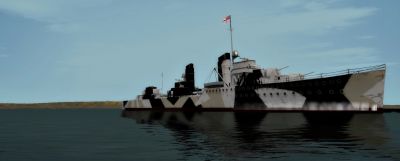J-K Destroyer
History
Considered a light destroyer during WWII, these ships were very effective as Channel convoy escorts. The J, K and N class consisted of 24 destroyers built for the Royal Navy beginning in 1938. They were a return to a smaller vessel, with a heavier torpedo armament, after the Tribal class that emphasised guns over torpedoes. The ships were built in three flotillas or groups, each consisting of eight ships with names beginning with "J", "K" and "N". The flag superior of the pennant numbers changed from "F" to "G" in 1940.
The ships were modified throughout their wartime service, particularly their anti-aircraft (AA) guns; they were also fitted with radar. The armament was based on that of the Tribals, but replaced one twin QF 4.7-inch (120 mm) Mark XII (L/45) gun mount with an additional bank of torpedo tubes. These mountings were capable of 40° elevation and 340° of training. Curiously, 'X' mounting was positioned such that the blind 20° arc was across the stern, rather than the more logical forward position where fire was obscured by the bridge and masts anyway. This meant that they were unable to fire dead astern. With the tubes now 'pentad', a heavy load of 10 21-inch (533 mm) Mark IX torpedoes could be carried.
Game Play
Non-armored hulls and light displacement made them unsuitable for operations in the deeper and rougher North Sea, and in Battleground Europe they are usually best employed in convoy with Transports taking tanks, trucks and troops across water on amphibious operations in the Channel Islands or when trying to invade across the English Channel. These light Destroyers were similar in size and armament to their German counterpart the Z34.
Crew Insights
Here is a detailed explanation on the type of crew and the Armament it controls.
- Position 1. Helmsman - Not much explanation required, from here you can turn the Engine On/Off and navigate the Boat.
- Position 2. Lookout - This Crew is Equipped with Binoculars.
- Position 3. Forward Fire Control - This Position would be the 3 Forward facing 128mm Deck Guns. Using the Primary Fire Key would command the 2 Bow (Front) Deck Guns while the Secondary Fire Key would use the Aft (rear) forward facing Deck Gun.
- Position 4. Bow Anti-Air Gunner - This Controller commands 2x 20mm Anti-Air Gun, Primary Fire Key would command the Port (Left) Anti-Air Guns
- Position 5. Aft Anti-Air Gunner - Again this Controller commands 2x 20mm Anti-Air Gun, Primary Fire Key would fire the forward gun and the Secondary Fire Key the rear Gun.
- Position 6. Port/Starboard Fire Controller - The Controller commands 2x 37mm Deck Guns. Primary Fire Key would fire the Starboard gun and the Secondary Fire Key the Port Gun.
- Position 7. Rear Fire Control - This Position would be the 2 Rear facing 128mm Deck Guns. Using the Primary Fire Key would command the rear most Deck Guns while the Secondary Fire Key would use the other.
- Position 8. Torpedo Controller - This would control the 2x 533mm Torpedo launchers. The Primary Fire Key would command the forward most launcher while the Secondary Fire Key would use the rear most.
